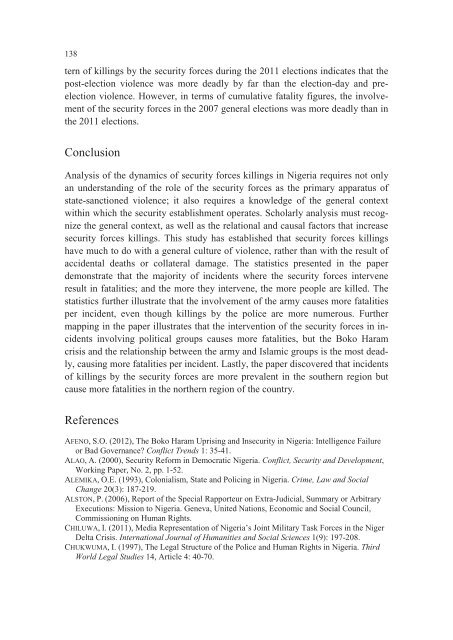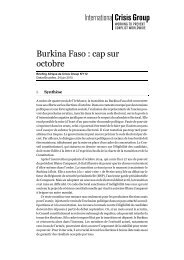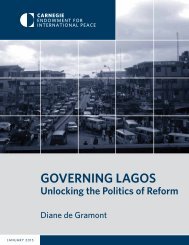Violence in Nigeria
ASC-075287668-3743-01
ASC-075287668-3743-01
You also want an ePaper? Increase the reach of your titles
YUMPU automatically turns print PDFs into web optimized ePapers that Google loves.
138<br />
tern of kill<strong>in</strong>gs by the security forces dur<strong>in</strong>g the 2011 elections <strong>in</strong>dicates that the<br />
post-election violence was more deadly by far than the election-day and preelection<br />
violence. However, <strong>in</strong> terms of cumulative fatality figures, the <strong>in</strong>volvement<br />
of the security forces <strong>in</strong> the 2007 general elections was more deadly than <strong>in</strong><br />
the 2011 elections.<br />
Conclusion<br />
Analysis of the dynamics of security forces kill<strong>in</strong>gs <strong>in</strong> <strong>Nigeria</strong> requires not only<br />
an understand<strong>in</strong>g of the role of the security forces as the primary apparatus of<br />
state-sanctioned violence; it also requires a knowledge of the general context<br />
with<strong>in</strong> which the security establishment operates. Scholarly analysis must recognize<br />
the general context, as well as the relational and causal factors that <strong>in</strong>crease<br />
security forces kill<strong>in</strong>gs. This study has established that security forces kill<strong>in</strong>gs<br />
have much to do with a general culture of violence, rather than with the result of<br />
accidental deaths or collateral damage. The statistics presented <strong>in</strong> the paper<br />
demonstrate that the majority of <strong>in</strong>cidents where the security forces <strong>in</strong>tervene<br />
result <strong>in</strong> fatalities; and the more they <strong>in</strong>tervene, the more people are killed. The<br />
statistics further illustrate that the <strong>in</strong>volvement of the army causes more fatalities<br />
per <strong>in</strong>cident, even though kill<strong>in</strong>gs by the police are more numerous. Further<br />
mapp<strong>in</strong>g <strong>in</strong> the paper illustrates that the <strong>in</strong>tervention of the security forces <strong>in</strong> <strong>in</strong>cidents<br />
<strong>in</strong>volv<strong>in</strong>g political groups causes more fatalities, but the Boko Haram<br />
crisis and the relationship between the army and Islamic groups is the most deadly,<br />
caus<strong>in</strong>g more fatalities per <strong>in</strong>cident. Lastly, the paper discovered that <strong>in</strong>cidents<br />
of kill<strong>in</strong>gs by the security forces are more prevalent <strong>in</strong> the southern region but<br />
cause more fatalities <strong>in</strong> the northern region of the country.<br />
References<br />
AFENO, S.O. (2012), The Boko Haram Upris<strong>in</strong>g and Insecurity <strong>in</strong> <strong>Nigeria</strong>: Intelligence Failure<br />
or Bad Governance? Conflict Trends 1: 35-41.<br />
ALAO, A. (2000), Security Reform <strong>in</strong> Democratic <strong>Nigeria</strong>. Conflict, Security and Development,<br />
Work<strong>in</strong>g Paper, No. 2, pp. 1-52.<br />
ALEMIKA, O.E. (1993), Colonialism, State and Polic<strong>in</strong>g <strong>in</strong> <strong>Nigeria</strong>. Crime, Law and Social<br />
Change 20(3): 187-219.<br />
ALSTON, P. (2006), Report of the Special Rapporteur on Extra-Judicial, Summary or Arbitrary<br />
Executions: Mission to <strong>Nigeria</strong>. Geneva, United Nations, Economic and Social Council,<br />
Commission<strong>in</strong>g on Human Rights.<br />
CHILUWA, I. (2011), Media Representation of <strong>Nigeria</strong>’s Jo<strong>in</strong>t Military Task Forces <strong>in</strong> the Niger<br />
Delta Crisis. International Journal of Humanities and Social Sciences 1(9): 197-208.<br />
CHUKWUMA, I. (1997), The Legal Structure of the Police and Human Rights <strong>in</strong> <strong>Nigeria</strong>. Third<br />
World Legal Studies 14, Article 4: 40-70.






